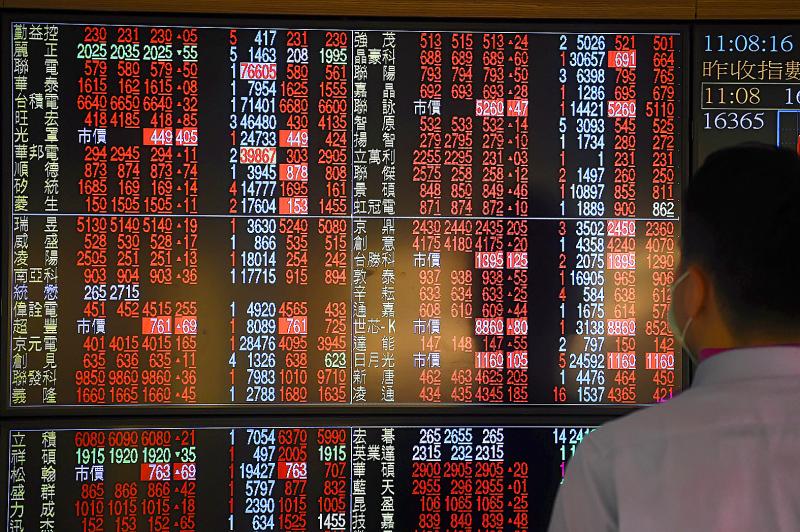The TAIEX moved sharply higher yesterday, the first trading session after the Lunar New Year holiday, to close at a new high, as the market tried to catch up with the strong gains in US markets during the break.
The bellwether electronics sector was behind the upturn, led by global contract chipmaker Taiwan Semiconductor Manufacturing Co (TSMC, 台積電), which continued to advance after a nearly 10 percent rise in its American depositary receipts (ADRs) during the holiday, dealers said.
The TAIEX ended 559.89 points, or 3.54 percent, higher at 16,362.29 on turnover of NT$413.177 billion (US$14.56 billion).

Photo: Chen Chih-chu, Taipei Times
Yesterday’s increase was the second-highest single-day rise in the market’s history, trailing only the 590.19 points jump on Nov. 29, 1989.
“Today’s solid gains were no surprise as investors here were encouraged by high-flying tech stocks, especially in the semiconductor industry, during the break,” Concord Securities Co (康和證券) analyst Kerry Huang (黃志祺) said.
Huang was referring specifically to the Philadelphia Semiconductor Index, which rose more than 7 percent during the break in Taiwan.
“In particular, TSMC, whose ADRs soared during the holiday, attracted strong buying at a time when semiconductors have become a critical material in the global economy,” Huang said.
TSMC rose 4.91 percent to close at NT$663. The stock contributed about 264 points to the TAIEX’s gains, and helped the electronics sector and the semiconductor sub-index rise by 4.09 percent and 5.19 percent respectively.
“Other large cap semiconductor stocks also got a boost, sending the electronics sector even higher during the session,” Huang said.
“Judging from the movement of these tech heavyweights, I think foreign institutional investors stood on the buy side,” Huang added.
Foreign institutional investors bought a net NT$29.69 billion of shares yesterday, Taiwan Stock Exchange data showed.
Non-tech stocks also narrowed their gap with their foreign counterparts, especially the petrochemical sector, Huang said.
China Petrochemical Development Corp (中石化) soared 10 percent to close at NT$10.40 and Formosa Plastics Corp (台塑) gained 7.13 percent to end at NT$96.20.
The financial sector posted robust gains as the yield on benchmark 10-year US Treasury notes kept growing, he said.
Fubon Financial Holding Co (富邦金控) rose 4.26 percent to close at NT$48.90 and Cathay Financial Holding Co (國泰金控) gained 3.33 percent to end at NT$41.95.
“Today’s expanded turnover showed that many investors were willing to chase prices,” Huang said. “In addition, the gains helped the TAIEX overcome stiff technical resistance ahead of 16,239 points, the intraday high on Jan. 21, so I expect the uptrend to continue.”

Sweeping policy changes under US Secretary of Health and Human Services Robert F. Kennedy Jr are having a chilling effect on vaccine makers as anti-vaccine rhetoric has turned into concrete changes in inoculation schedules and recommendations, investors and executives said. The administration of US President Donald Trump has in the past year upended vaccine recommendations, with the country last month ending its longstanding guidance that all children receive inoculations against flu, hepatitis A and other diseases. The unprecedented changes have led to diminished vaccine usage, hurt the investment case for some biotechs, and created a drag that would likely dent revenues and

Global semiconductor stocks advanced yesterday, as comments by Nvidia Corp chief executive officer Jensen Huang (黃仁勳) at Davos, Switzerland, helped reinforce investor enthusiasm for artificial intelligence (AI). Samsung Electronics Co gained as much as 5 percent to an all-time high, helping drive South Korea’s benchmark KOSPI above 5,000 for the first time. That came after the Philadelphia Semiconductor Index rose more than 3 percent to a fresh record on Wednesday, with a boost from Nvidia. The gains came amid broad risk-on trade after US President Donald Trump withdrew his threat of tariffs on some European nations over backing for Greenland. Huang further

Macronix International Co (旺宏), the world’s biggest NOR flash memory supplier, yesterday said it would spend NT$22 billion (US$699.1 million) on capacity expansion this year to increase its production of mid-to-low-density memory chips as the world’s major memorychip suppliers are phasing out the market. The company said its planned capital expenditures are about 11 times higher than the NT$1.8 billion it spent on new facilities and equipment last year. A majority of this year’s outlay would be allocated to step up capacity of multi-level cell (MLC) NAND flash memory chips, which are used in embedded multimedia cards (eMMC), a managed

CULPRITS: Factors that affected the slip included falling global crude oil prices, wait-and-see consumer attitudes due to US tariffs and a different Lunar New Year holiday schedule Taiwan’s retail sales ended a nine-year growth streak last year, slipping 0.2 percent from a year earlier as uncertainty over US tariff policies affected demand for durable goods, data released on Friday by the Ministry of Economic Affairs showed. Last year’s retail sales totaled NT$4.84 trillion (US$153.27 billion), down about NT$9.5 billion, or 0.2 percent, from 2024. Despite the decline, the figure was still the second-highest annual sales total on record. Ministry statistics department deputy head Chen Yu-fang (陳玉芳) said sales of cars, motorcycles and related products, which accounted for 17.4 percent of total retail rales last year, fell NT$68.1 billion, or